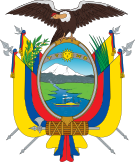
Back Държавно устройство на Еквадор Bulgarian Política de l'Equador Catalan Política de Ecuador Spanish Politique en Équateur French Política de Ecuador Galician Política do Equador Portuguese
This article has multiple issues. Please help improve it or discuss these issues on the talk page. (Learn how and when to remove these template messages)
|
 |
|---|
|
|
The politics of Ecuador are multi-party.[1] The central government polity is a quadrennially elected presidential, unicameral representative democracy. The President of Ecuador is head of state and head of the army on a multi-party system, and leads a cabinet with further executive power. Legislative power is not limited to the National Assembly, as it may to a lesser degree be exercised by the executive which consists of the President convening an appointed executive cabinet. Subsequent acts of the National Assembly are supreme over Executive Orders where sufficient votes have been cast by the legislators. The judiciary is independent of the executive and the legislature. Ecuador is also considered a constitutional republic.[2]
The Constitution of Ecuador provides for a four-year term of office for the President, Vice-President, and members of the National Assembly with concurrent elections. Presidents and legislators may be re-elected immediately. Citizens must be at least 16 years of age to vote: suffrage is universal and compulsory for literate persons aged 18 to 65 and optional for 16 and 17 years of age and other eligible voters.
The Economist Intelligence Unit rated Ecuador a "hybrid regime" in 2022.[3]
- ^ "Ecuador". NIMD. Retrieved 26 April 2019.
- ^ "ECUADOR" (PDF). U.S. Department of State. Archived from the original (PDF) on 17 April 2011.
- ^ "Democracy Index 2022: Frontline democracy and the battle for Ukraine" (PDF). Economist Intelligence Unit. 2023. Retrieved 9 February 2023.
© MMXXIII Rich X Search. We shall prevail. All rights reserved. Rich X Search